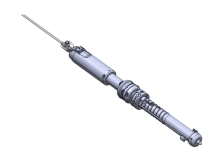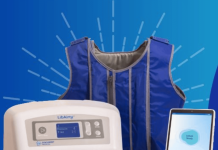While, we have heard about a high-tech toilet seat to monitor your heart, now Magenta Medical, an Israeli medtech startup that has developed the world’s smallest heart pump, has raised $55 million in a recent funding round. The investment was led by OrbiMed, a global healthcare investment manager known for its backing of Carrot Fertility, and saw participation from existing investors, including New Enterprise Associates (NEA), Pitango VC, and ALIVE, an Israel HealthTech Fund.
Less invasive tech
The company’s proprietary heart pump is designed to support patients with heart failure, and is implanted through a minimally invasive procedure that does not require open-heart surgery. According to Magenta Medical, the device is less invasive and less risky than traditional pumps, and can be implanted in under an hour.
Magenta Medical plans to use the new funds to support further development of its heart pump technology and to pursue regulatory approvals in key markets, including the United States and Europe. The company also plans to use the funding to expand its commercial operations and to build out its team of engineers and clinical experts.
The company’s technology has the potential to transform the treatment of heart failure, a condition that affects millions of people worldwide and is a leading cause of hospitalisation and death.
Among the many purposes, the funds will be used to advance the clinical programs of the company’s product in the United States toward its first FDA approval.
“Magenta is proud to add OrbiMed to its growing roster of leading MedTech investors as a highly reputable partner for innovative medical device companies,” said Dr. David Israeli, CEO of Magenta Medical. “I am confident that together we can build an organization well-equipped to bring to the market high-impact technology that can potentially address multiple unmet needs in the general cardiology patient population, as well as in many under-served patient groups.”
Dr. Duane Pinto of Beth Israel Deaconess Medical Center and Harvard Medical School said, “Magenta’s device is inserted with ease percutaneously and can accommodate the full gamut of flows required by MCS patients in the various situations I encounter as an interventional cardiologist. Use of this technology can be mastered by a wide range of proceduralists to better address the unmet needs of contemporary patients, such as those with small or challenging vascular anatomies, especially if high flows are needed.”
“We are excited to have identified the merits of Magenta’s technology, with its strong disruptive potential, and are extremely pleased with the relationships that we have built with management, the founders, and the existing investors,” said Dr. David Bonita, General Partner at OrbiMed. “We look forward to advancing the clinical programs and accelerating the introduction of this important technology to the market in the US and globally.”
RELATED: Healthy.io raises $50M to expand smartphone kidney test in U.S.
Powerful, expandable heart pump
Founded by serial entrepreneurs Professor Ehud Schwammenthal and Yosi Tuval, who previously founded medical device company Ventor Technologies, which was later acquired by Medtronic, Magenta Medical has been developing novel device solutions for the treatment of acute and chronic heart failure since its debut in 2012.
The heart pump is inserted through the groin using a small puncture and expanded for activation inside the left ventricle, with the flow of the pump adjusted based on the clinical circumstances of the patient.
Once the technology is approved, physicians will be able to use a single device to treat the full range of mechanical circulatory support patients, eliminating the need to escalate therapy to a new device and subject the patient to unnecessary and invasive replacement procedures. The miniaturised device pumps the blood for the patient over a course of hours or days to allow the heart to rest and the patient to recover.
The device’s potential advantages were recognised by the US Food and Drug Administration (FDA), which granted it Breakthrough Device Designation for two indications: high-risk percutaneous coronary intervention and cardiogenic shock.




